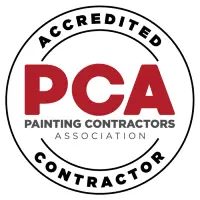Hiring a professional painter for your home is not a simple task. It requires more than just finding someone who can handle the job. Homeowners often prioritize cost, but choosing a painter based solely on price can lead to poor results. Hiring the right painter is about finding someone reliable, experienced, and trustworthy.
To guide your search, here are key questions to ask a painter to make sure that you hire the best professional for your project. With these key questions to ask a house painter, you can avoid unpleasant surprises and protect your investment in the long term.
Do You Have Insurance?
Insurance is one of the most important considerations when hiring a painter. Always ask if the painter has both general liability insurance and workers’ compensation. Liability insurance will protect your property in case of any damage during the painting process. Workers’ compensation protects you from being held liable if a worker gets injured on your property.
Do not hesitate to ask for proof of coverage and check the validity with the insurance provider. Some painters may try to tell you they have insurance without offering proof, which should raise red flags. A professional painter will always carry these necessary protections.
What Type of Paint Do You Use?
The quality of the paint used for your project matters greatly. High-quality paint will last longer and deliver better results. Ask the painter about the brands and types of paint they use, and request specifics on the finishes and coatings suitable for your project. Quality paints contain superior ingredients, such as higher levels of resins and pigments.
Make sure the painter uses paints appropriate for your home’s climate and surfaces. If you want an environmentally friendly option, ask about low or zero-VOC paints. Remember that price is often an indicator of quality when it comes to paint products, and the cheapest option may not be the best choice.
Are You Licensed and Bonded?
A valid license indicates that a painter has the required training and complies with local laws and regulations. Bonding, on the other hand, provides financial protection in case the painter fails to meet the contract’s terms. Hiring an unlicensed or unbonded painter exposes you to unnecessary risks.
Many jurisdictions require contractors to obtain a license, so ask for documentation to verify this. Bonding is a further safeguard that ensures the painter’s work is protected. Always ask about these credentials upfront and verify their legitimacy.
Can You Provide References or Testimonials?
A reputable painter should be able to offer references or testimonials from previous clients. This allows you to gauge the quality of their work and customer service. It also offers a way to verify that the painter can be trusted. Ask for contact details of at least three recent clients.
These references should be willing to speak to you about their experience and the quality of the work. If the painter cannot provide references or hesitates to do so, this could be a warning sign. A reputable professional will have no trouble providing examples of satisfied customers.
How Will You Protect My Property During the Job?
Painting can get messy, and protecting your furniture, flooring, and other belongings is essential. Professional painters should have a plan to safeguard your home during the project. This includes covering furniture, using drop cloths, and properly taping off areas to prevent spills and splatters. Ask the painter about their process for protecting your property.
A detailed plan should be in place to avoid unnecessary mess or damage. Ensure that the painter uses high-quality materials to safeguard your home and belongings, and ask about their cleanup process once the job is finished.
What Is Your Process for Preparing the Surface?
Proper surface preparation is key to achieving long-lasting and professional results. The painter should inspect and prepare your surfaces before applying any paint. This includes cleaning, patching, sanding, and priming surfaces as needed. Skipping or rushing through surface preparation leads to peeling paint and premature wear.
Ask the painter what steps they will take to prepare your surfaces. If they downplay this step or rush the explanation, it may be a sign they are cutting corners. Good preparation is essential for a smooth, durable finish.
What Is the Estimated Timeline for Completion?
Understanding how long the job will take helps you plan and avoid unnecessary delays. Ask the painter for an estimated timeline and get it in writing. Professional painters should be able to give you an accurate estimate based on the scope of the job.
Ensure the painter clearly explains any potential delays that could affect the timeline, such as weather conditions or material availability. Keep in mind that quality work may take time, and the cheapest option may rush through the project. Set expectations upfront to avoid misunderstandings later.
What Is Included in Your Written Estimate?
A detailed written estimate protects both you and the painter by outlining the scope of work, materials, and costs involved. Always ask for a written estimate before any work begins. The estimate should include all necessary details, such as surface preparation, materials used, labor costs, and the projected completion date.
This prevents hidden fees from appearing once the job is underway. Make sure that the estimate is clear, specific, and includes all aspects of the project. If the painter is unwilling to offer a written estimate or tries to keep it vague, it could be a red flag.
How Do You Handle Unexpected Issues or Changes?
While painting projects often go as planned, there are times when unexpected issues arise. Whether it is the discovery of mold, water damage, or an issue with the surface, these problems may require adjustments to the plan.
Ask the painter how they handle unforeseen complications and changes. A professional painter will have a process for dealing with these issues, including communicating the problem to you and getting your approval before proceeding with any changes. Clear communication ensures you are not blindsided by extra costs or extended timelines.
What Kind of Warranty Do You Offer?
Warranties give you peace of mind that the painter will stand behind their work. Ask the painter about the terms and length of their warranty. A reputable painter should offer a warranty on both labor and materials. Typically, warranties last between one to three years, though some companies offer longer warranties.
It is also important to know what is covered and what is not. Make sure the warranty is in writing and review the terms carefully. A warranty provides protection in case the paint job deteriorates or there are other issues within a certain time frame.
How Do You Handle Clean-Up?
Clean-up is often an overlooked aspect of any painting project, but it is an essential part of the process. A professional painter should ensure your home is left clean and organized once the work is completed. Ask the painter how they handle clean-up at the end of each workday and at the completion of the project. Do they remove all tools, drop cloths, and paint cans?
Do they dispose of paint waste properly? A painter who leaves behind a mess may not be as thorough in other areas of their work. If you want the project completed without a trail of dust and debris, it is worth discussing clean-up upfront. Ensure that the painter commits to leaving your home as clean as it was before they began. Some companies may even offer a final cleaning service as part of their package.
Do You Have a Detailed Contract?
A contract is essential for protecting both you and the painter. It should outline every aspect of the project, including the scope of work, materials used, payment schedule, and project timeline. A professional painter will always provide a written contract that clearly defines the expectations on both sides. Do not rely on verbal agreements, as they can lead to misunderstandings down the line.
Ensure the contract specifies the details, such as the exact areas to be painted, the number of coats, and any prep work that will be done. The contract should also address how the painter will handle any delays or unexpected complications. Make sure the contract is signed before work begins, and review the details carefully to avoid any confusion later.
What Steps Will You Take to Minimize Disruptions to My Daily Life?
Painting can disrupt your daily routine, especially if you are living in the home while the work is being done. Professional painters should do their best to minimize disruptions and make the process as smooth as possible. Ask the painter how they plan to handle this. Will they work around your schedule? Do they have a strategy for containing the smell of paint or preventing noise during certain hours?
A good painter will respect your time and privacy. Inquire about how the crew will maintain a balance between quality work and minimal disruption. This is especially important for families with young children or individuals with specific schedules.
Can You Help With Color Selection?
Choosing the right color for your home can be daunting. Many homeowners struggle to decide on the best shades that complement their space and fit their style. A professional painter should be willing to help guide you through this process. Ask if they offer color consultation services or if they have any tips for choosing colors that work well together.
Some painters may have experience working with certain color palettes, which can be helpful if you are undecided. Additionally, professional painters often have access to color samples that can help you visualize how a color will look in your home.
What Kind of Prep Work Will Be Done to Protect the Surfaces?
Surface preparation is often what separates a good paint job from a great one. Ask the painter about the preparation work they will do before applying paint. Will they scrape off old paint? Will they sand or clean the surfaces to ensure good adhesion? Surface preparation is a critical step, especially if the surface is in poor condition.
If the painter skims over this process or does not include it in their estimate, it could be a sign they do not pay attention to detail. A good painter will take the time to clean, repair, and prepare surfaces, ensuring the paint bonds properly and lasts longer. Proper prep work can be the difference between a paint job that looks good for a few months and one that holds up for years.
What Happens If the Weather Affects the Project?
Weather can affect both interior and exterior painting projects. For exterior jobs, rain, extreme heat, or humidity can prevent paint from adhering properly. If the project is indoors, weather-related issues such as high humidity can also impact the drying process. Ask the painter how they handle weather-related delays or challenges.
A professional will account for the possibility of inclement weather and include contingencies in the contract. They should communicate clearly with you if the project timeline needs to be adjusted due to weather conditions. This transparency is key to avoiding frustration later.
How Do You Handle Paint Touch-Ups?
Sometimes, even with careful attention to detail, a few areas may require touch-ups after the job is completed. It is important to ask the painter how they handle these situations. Will they come back to fix any areas that need attention? How long after the job is completed can you request touch-ups? Will there be an additional charge for touch-ups, or is it covered under the contract?
A professional painter should be willing to address any touch-ups that are necessary. It is always better to ask about this beforehand so you know exactly what to expect. If the painter offers a warranty or guarantees their work, you can have peace of mind knowing they will stand behind the job and make things right if issues arise after the project is finished.
What Are the Payment Terms?
Understanding the payment terms before the project begins is essential to avoid surprises later. Ask the painter about their payment schedule and method of payment. Many contractors require a deposit upfront, with the remainder of the payment due upon completion of the project. Make sure the payment terms are clearly outlined in the contract.
Avoid painters who ask for a large upfront payment or insist on being paid entirely before the work is completed. A professional painter will request reasonable deposits and give you a clear timeline for payments.
What Sets You Apart from Other Painters?
There are many painters out there, and not all are equal. To help you decide whether a painter is the right fit, ask what sets them apart from other painters in the area. Do they have specialized skills or certifications that make them stand out? How do they ensure a quality result and customer satisfaction?
A good painter will highlight the aspects of their service that make them unique. They may emphasize their experience, their commitment to using high-quality materials, or their ability to communicate clearly with clients. In asking this question, you gain insight into the painter’s values and professionalism.
Do You Have a Portfolio of Past Work?
Seeing examples of a painter’s past projects is one of the best ways to evaluate their skills. Ask if they have a portfolio, either in print or online, that showcases their previous work. A professional painter should have a collection of before-and-after photos, testimonials, or references that demonstrate their expertise.
Review their portfolio carefully to ensure their work aligns with the quality and style you are looking for. Pay attention to the consistency of their work. Do the results appear polished and professional across different types of projects? If the painter does not have a portfolio or hesitates to provide one, this could be a red flag.
At CERTAINTY PAINTING, we believe in clear communication, high-quality craftsmanship, and customer satisfaction. With over 2,200 completed projects and more than 100 years of combined experience, we are committed to delivering exceptional results every time. Our residential painting services are designed to transform your home with precision and care.
We take pride in our work and provide free estimates, clear timelines, and a no-surprise guarantee. If you are looking for a trusted painting company in Rochester, MI, our team is ready to help. Reach out to us today for your free consultation and experience the difference a true professional can make.




